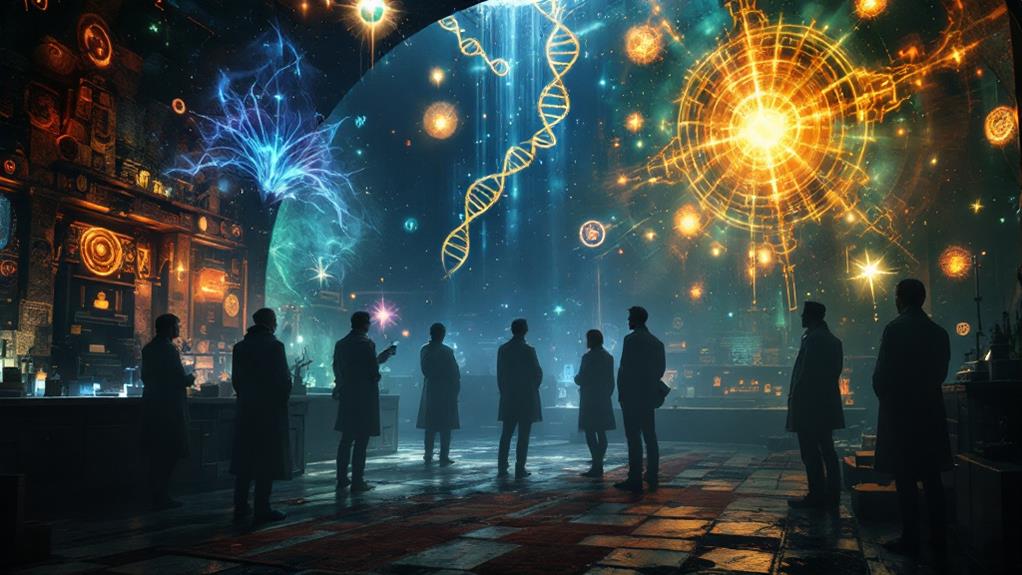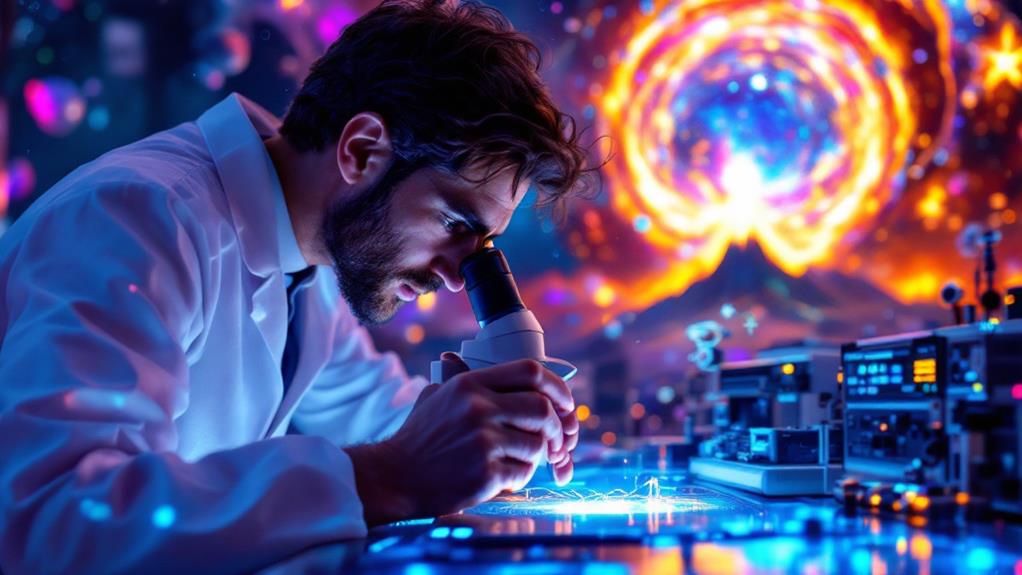How Scientific Discoveries Can Change Our Lives: Real-World Impacts
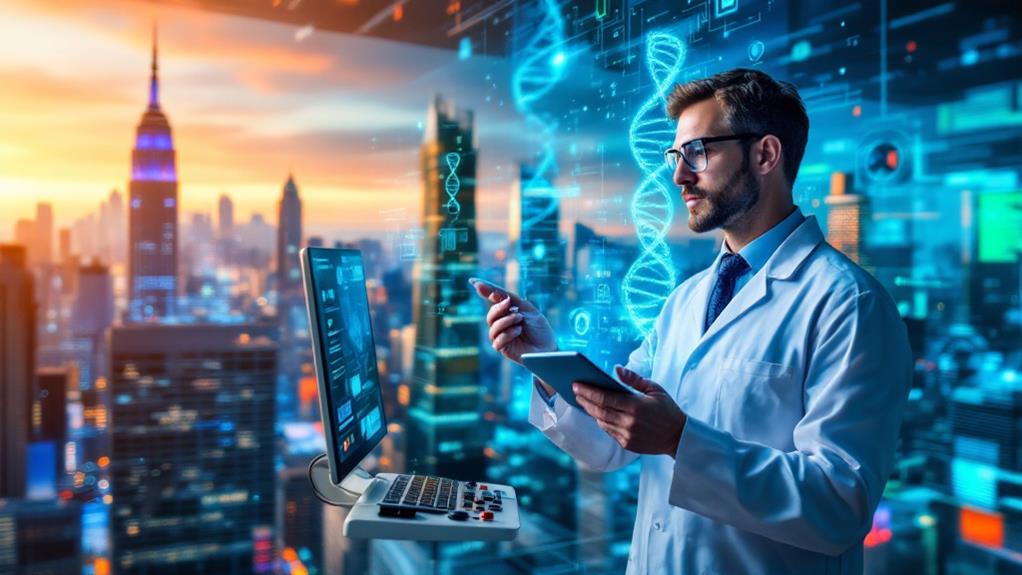
Scientific discoveries have altered every aspect of your life, from the smartphone in your pocket to the medicines keeping you healthy. Medical breakthroughs offer customized treatments, while the digital revolution connects you globally. Space exploration drives innovation in everyday technologies, and clean energy solutions shape a sustainable future. Agricultural advancements guarantee food security, while materials science creates smarter products. AI applications streamline tasks, and transportation innovations redefine mobility. Neuroscience findings improve your understanding of human behavior and decision-making. These real-world impacts of scientific discoveries continue to evolve, promising even more substantial changes in the years to come.
Medical Breakthroughs
Medical breakthroughs have revolutionized our health and longevity. These advancements have altered the way we diagnose, treat, and prevent diseases, offering hope for conditions once considered incurable. You're now benefiting from innovations like personalized medicine, which tailors treatments to your unique genetic makeup, increasing effectiveness and reducing side effects.
Disease prevention has taken center stage, with vaccines and early screening techniques helping you avoid illnesses before they take hold. Imagine catching cancer at its earliest stages or predicting your risk of heart disease decades in advance. These aren't just possibilities; they're becoming realities.
Cutting-edge technologies like gene editing and stem cell therapy are rewriting the rules of medicine. You might soon see treatments for genetic disorders that were once thought untreatable. Artificial intelligence is accelerating drug identification, potentially bringing life-saving medications to market faster than ever before.
As medical science progresses, you're likely to experience longer, healthier lives. The impact of these breakthroughs extends beyond individual health, reshaping societies and economies as people live and work longer, challenging our traditional notions of aging and retirement.
Digital Revolution
The digital revolution has turned our world upside down, altering nearly every aspect of daily life. You're now living in an era where information is at your fingertips, communication is instantaneous, and technology is integrated into everything you do. This change has brought both incredible opportunities and new challenges.
Data mining has become a powerful tool, allowing businesses and researchers to extract useful insights from vast amounts of information. You're benefiting from personalized recommendations, improved healthcare outcomes, and more efficient services. However, this also raises concerns about online privacy. You're constantly leaving digital footprints, and it's essential to be aware of how your data is being collected and used.
The digital revolution has impacted various sectors:
- Education: Online learning platforms and interactive tools have transformed how you acquire knowledge
- Commerce: E-commerce has altered shopping habits, offering convenience and global access
- Entertainment: Streaming services and social media have changed how you consume and share content
As you navigate this digital landscape, it's vital to stay informed about technological advancements and their implications. Embracing the benefits while being mindful of potential risks will help you make the most of this transformative era.
Space Exploration
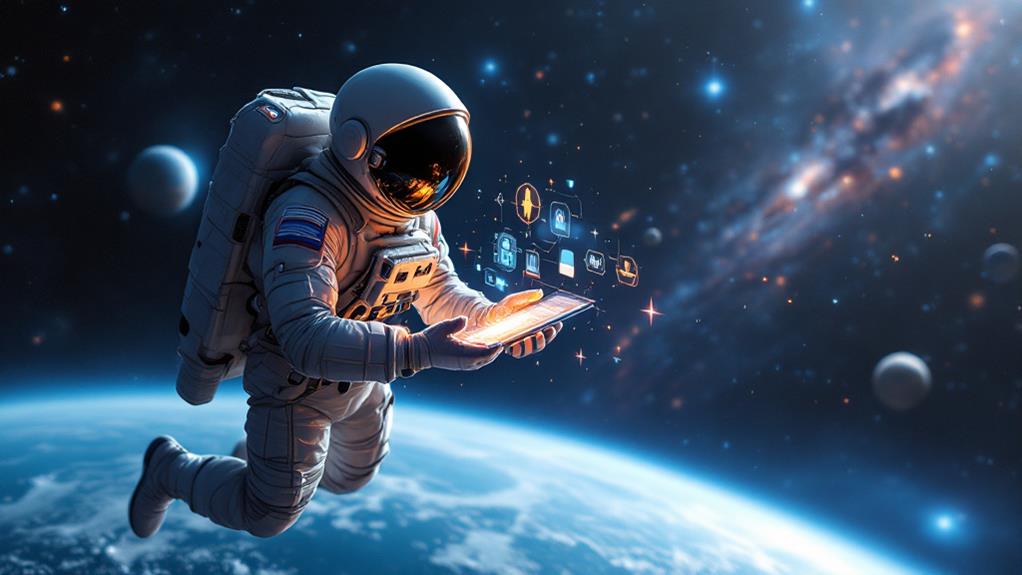
Beyond our planet's atmosphere, space exploration continues to expand the frontiers of human knowledge and technological capability. As you look to the stars, you'll find that advancements in space technology have far-reaching impacts on your daily life. Satellite communications, weather forecasting, and GPS routing are just a few examples of how space exploration has revolutionized the way you interact with the world.
The future of space exploration holds even more promise. Asteroid mining could provide a sustainable source of rare minerals, reducing the strain on Earth's resources and potentially revolutionizing industries back home. You might soon see the development of lunar habitats, establishing the groundwork for long-term human presence beyond Earth. These off-world settlements could serve as stepping stones for further exploration of our solar system.
Space exploration also drives innovation in fields like materials science, robotics, and life support systems. These advancements often find applications in everyday life, from more efficient solar panels to advanced medical technologies. As we continue to expand the horizons of space exploration, you can expect to see more scientific breakthroughs that will shape your future in ways you may not yet imagine.
Clean Energy Solutions
With the global push towards sustainability, clean energy solutions are revolutionizing how we power our world. You're witnessing a shift from fossil fuels to renewable energy sources that promise a cleaner, greener future. Solar panels, wind turbines, and hydroelectric dams are becoming increasingly common sights, altering landscapes and energy grids alike.
These sustainable energy systems aren't just reducing carbon emissions; they're also creating new jobs and driving technological innovation. You'll find that clean energy solutions are impacting various aspects of your daily life:
- Electric vehicles are becoming more affordable and accessible
- Smart homes are integrating solar power and energy-efficient appliances
- Cities are redesigning infrastructure to accommodate renewable energy sources
As you welcome these changes, you're contributing to a more sustainable future. The passage to clean energy isn't without challenges, but scientists and engineers are constantly developing new technologies to overcome these obstacles. From improved energy storage solutions to more efficient solar cells, these advancements are making clean energy increasingly viable and cost-effective. You're living in an exciting time of rapid progress in the field of sustainable energy.
Agricultural Advancements
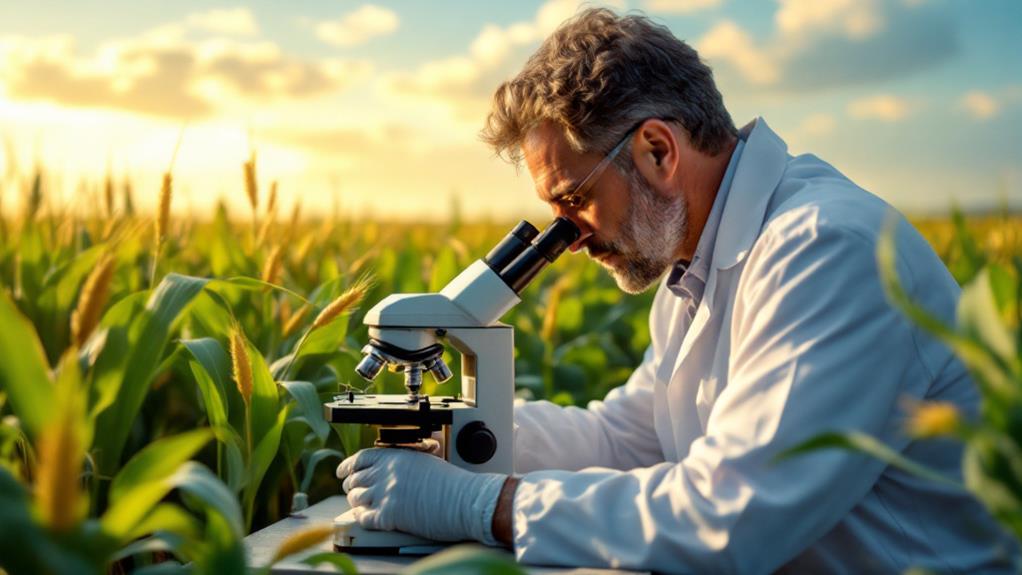
Revolutionizing the way we grow and distribute food, agricultural advancements are altering global food systems. You're witnessing a transformation in farming methods that's improving crop yields, reducing environmental impact, and enhancing food security worldwide.
Sustainable farming practices are at the forefront of this revolution. You'll find farmers adopting techniques like crop rotation, integrated pest management, and water conservation. These methods not only preserve soil health but also reduce the need for harmful chemicals, ensuring safer food production.
Precision agriculture techniques are changing the game. You're seeing farmers use GPS-guided tractors, drones, and IoT sensors to monitor crop health, soil conditions, and water needs in real-time. This data-driven approach allows for targeted interventions, optimizing resource use and minimizing waste.
Genetic engineering and CRISPR technology are enabling the development of crops resistant to pests, diseases, and harsh environmental conditions. You'll benefit from increased food availability and nutritional value as scientists enhance crop traits to meet global challenges.
These advancements are essential as we face climate change and population growth, ensuring a more sustainable and secure food future for you and generations to come.
Environmental Conservation
Scientific findings are shaping the future of environmental conservation, offering innovative solutions to pressing ecological challenges. You'll find that these revelations are revolutionizing how we approach biodiversity protection and ecosystem restoration. Through advanced technologies and data analysis, scientists are now able to monitor endangered species more effectively, track climate change impacts, and develop targeted conservation strategies.
Cutting-edge research is also unveiling innovative restoration techniques. You can see this in action through:
- Genetic engineering to increase species resilience
- Artificial intelligence-driven habitat mapping
- Advanced reforestation methods using drones
These scientific breakthroughs are helping you and future generations preserve our planet's natural heritage. They're enabling more precise identification of at-risk areas and species, allowing for more efficient allocation of conservation resources. You'll notice that ecosystem restoration efforts are becoming increasingly sophisticated, with scientists developing new ways to rehabilitate damaged habitats and reintroduce native species. By utilizing the power of science, you're part of a global movement working towards a more sustainable future, where biodiversity thrives and ecosystems remain balanced for generations to come.
Materials Science Innovations

Materials science innovations are reshaping our world in extraordinary ways. You're likely to encounter these advancements in your daily life, often without realizing it. Smart fabrics, for instance, are revolutionizing the clothing industry. These textiles can adapt to your body temperature, monitor your vital signs, or even change color based on your mood or surroundings. Imagine wearing a shirt that cools you down on hot days or a jacket that lights up for better visibility at night.
Self-healing materials are another pioneering development. These substances can repair themselves when damaged, extending the lifespan of various products. You might soon find self-healing smartphone screens that fix their own cracks or car paint that automatically fills in scratches. This technology could considerably reduce waste and the need for replacements.
Other materials science breakthroughs include ultra-strong, lightweight composites for aerospace applications, biodegradable plastics to combat pollution, and advanced energy storage materials for better batteries. As these innovations continue to evolve, you'll see their impact across industries, from consumer goods to infrastructure, altering the way you interact with the world around you.
Artificial Intelligence Applications
As artificial intelligence (AI) continues to advance at a rapid pace, you're likely to encounter its applications in various aspects of your daily life. From virtual assistants on your smartphone to personalized recommendations on streaming platforms, AI's influence is growing exponentially. Machine learning capabilities are enabling AI systems to analyze vast amounts of data and make predictions with increasing accuracy, revolutionizing industries like healthcare, finance, and transportation.
Natural language processing innovations have dramatically improved AI's ability to understand and generate human language, leading to more sophisticated chatbots and translation services. You might find yourself interacting with AI-powered customer service representatives or using AI-generated content without even realizing it.
The impact of AI on your daily life is likely to expand in the coming years, with applications such as:
- Autonomous vehicles that could revolutionize transportation
- AI-driven medical diagnosis and treatment planning
- Personalized education systems customized to individual learning styles
As AI technology continues to evolve, it's vital to stay informed about its potential benefits and challenges. By understanding AI's capabilities and limitations, you can better navigate the rapidly changing field of technology-driven innovations that are shaping our world.
Transportation Transformations
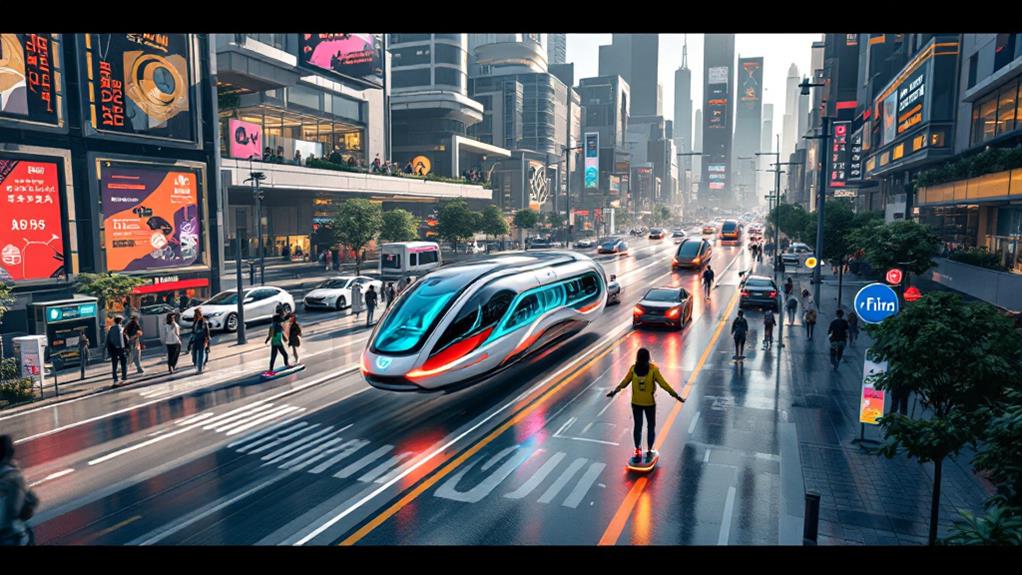
On the horizon of transportation innovation, you'll find cutting-edge technologies positioned to revolutionize how we move from place to place. Autonomous vehicles are at the forefront of this transformation, promising to reduce accidents, improve traffic flow, and provide mobility for those unable to drive. You'll soon see these self-driving cars on your streets, changing the way you commute and travel.
Sustainable fuels are another game-changer in transportation. As you become more environmentally conscious, you'll appreciate the shift towards electric vehicles, hydrogen fuel cells, and biofuels. These alternatives will help reduce your carbon footprint and decrease dependence on fossil fuels.
High-speed rail and hyperloop systems are set to redefine long-distance travel. You'll be able to cover vast distances in a fraction of the time, making intercity commutes more feasible and reducing the need for short-haul flights. Urban mobility is also evolving with the introduction of smart traffic management systems and connected infrastructure. You'll experience smoother, more efficient city wayfinding as these technologies optimize traffic flow and reduce congestion.
Neuroscience and Human Behavior
Pioneering findings in neuroscience are reshaping our understanding of human behavior and mental processes. You're now able to gain perspectives into how your brain functions, influencing decision-making, emotions, and social interactions. Neuroscientific research has revealed the impact of cognitive biases on your daily choices, helping you recognize and potentially overcome these unconscious influences.
Advances in social cognition studies have illuminated how you perceive and interact with others, shedding light on empathy, prejudice, and group dynamics. This knowledge can improve your relationships and cultivate more effective communication. Additionally, neuroscience has paved the way for innovative treatments for mental health disorders, offering hope for those struggling with conditions like depression and anxiety.
Neuroscience is making meaningful progress in three key areas:
- Brain plasticity and learning
- Neuroimaging techniques for early disease detection
- Neural interfaces for assistive technologies
As neuroscience continues to evolve, you'll likely see its applications extend beyond healthcare into fields like education, marketing, and artificial intelligence. These advancements will inevitably shape how you live, work, and interact with the world around you.
